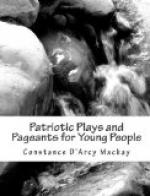THE SPIRITS OF THE OLD MANSE. Greek robes in colored cheesecloth or cotton crepe. There are eight of these maidens, and the colors they wear are pale-green, pale-lavender, pale-yellow, and pale-blue. They carry great garlands of moss interwoven with pine—about two yards for each player, so that it can be held gracefully. White stockings and sandals. Hair bound With Greek fillets of white or of silver. Symbolically these spirits represent Joy, Mystery, Peace, Dreams, Hope, Aspiration, Fulfilment, Ecstasy.
MUSIC. The songs of the episodes are already indicated on pages 194 and 203. The music for the chorus of the Spirits of the Old Manse can be found in “Songs of the West,” by S. Baring Gould, which is a collection of the Folk Songs of Devon and Cornwall, collected from the mouths of the people. The music of this chorus is set to the seventeenth-century folk song called “The Sweet Nightingale” ("My sweetheart, come along,” etc.). The incidental music for the Hawthorne Pageant when it is given indoors should be from Edward MacDowell’s “New England Idylls” Op. 62, and from his “Indian Suite.” “From an Old Garden,” “Midsummer,” “An Indian Idyll,” and “From Puritan Days” can be played between the episodes and the Dance Interlude. An orchestra or piano can add to the music of Faunch’s fiddle in the Merrymount scene. The music for the procession should be very stately, and by a seventeenth-century composer, if possible.
NOTES ON DIRECTING THE PAGEANT. The first verse of the chorus of the Spirits of the Old Manse should be sung off stage in the indoor production. The stage should be darkened: footlights low. With the next verse the spirits enter, four from right, and four from left, mystic, half-seen figures. As they enter the lights gradually begin to come up, until with the middle of the second verse there is full strong daylight. If the eight voices are not enough a hidden augmented chorus can be behind the scenes. If the stage is such that it can be darkened and lighted at will, a fire-glow effect should be given for the Merrymount scene. The light for all the scenes should be that of strong daylight. There should be no curtain. The characters simply appear and disappear. After the Spirits of the Manse have made their exit the Prologue enters. The procession at the end of the play may simply cross the scene to march music, the players not stiffly moving in ones and twos, but in more or less significant groups.
Those who direct the pageant should see to it that the players speak the dialogue in the episodes with the utmost briskness. There should be no waits and pauses. Simon Scarlett especially should enunciate clearly and swiftly, with dash and fire in both voice and gesture. Even if some of the words are lost, it is better to keep up the tempo of the piece. Philippe Beaucoeur should also speak with a rush of energy and determination. The players who are on the scene but not speaking, should develop their pantomimic powers, and form animated groups; their interest should be first with one character who is speaking, and then with another. They should never stand idle, looking blankly at the audience, as so many amateurs are in the habit of doing. In the Salem episode they should surge forward and back, and discuss in pantomimic groups all that is happening.




